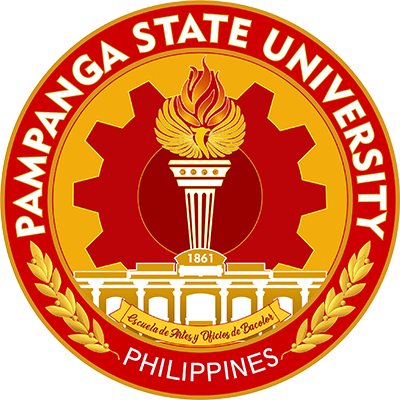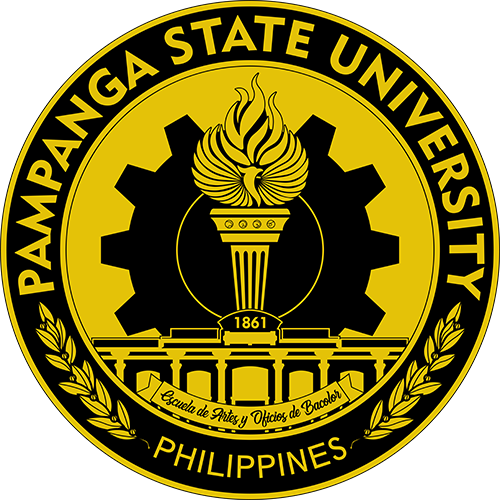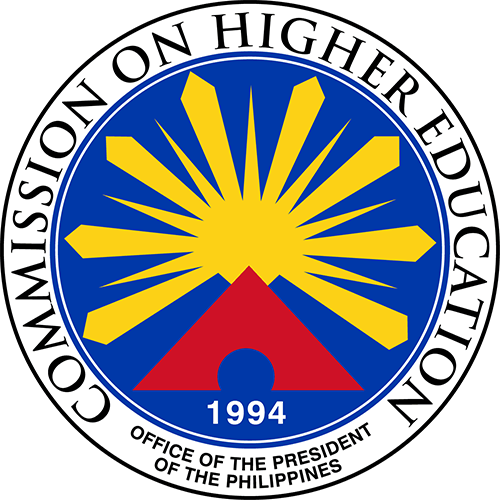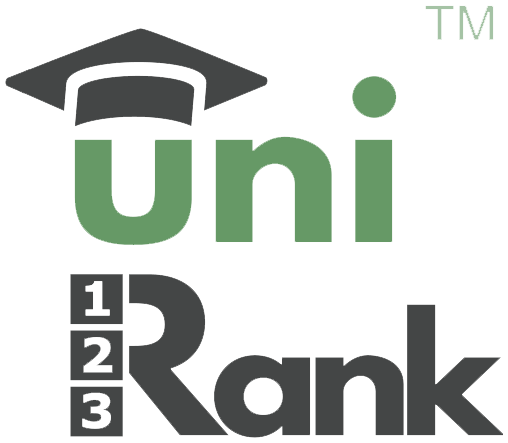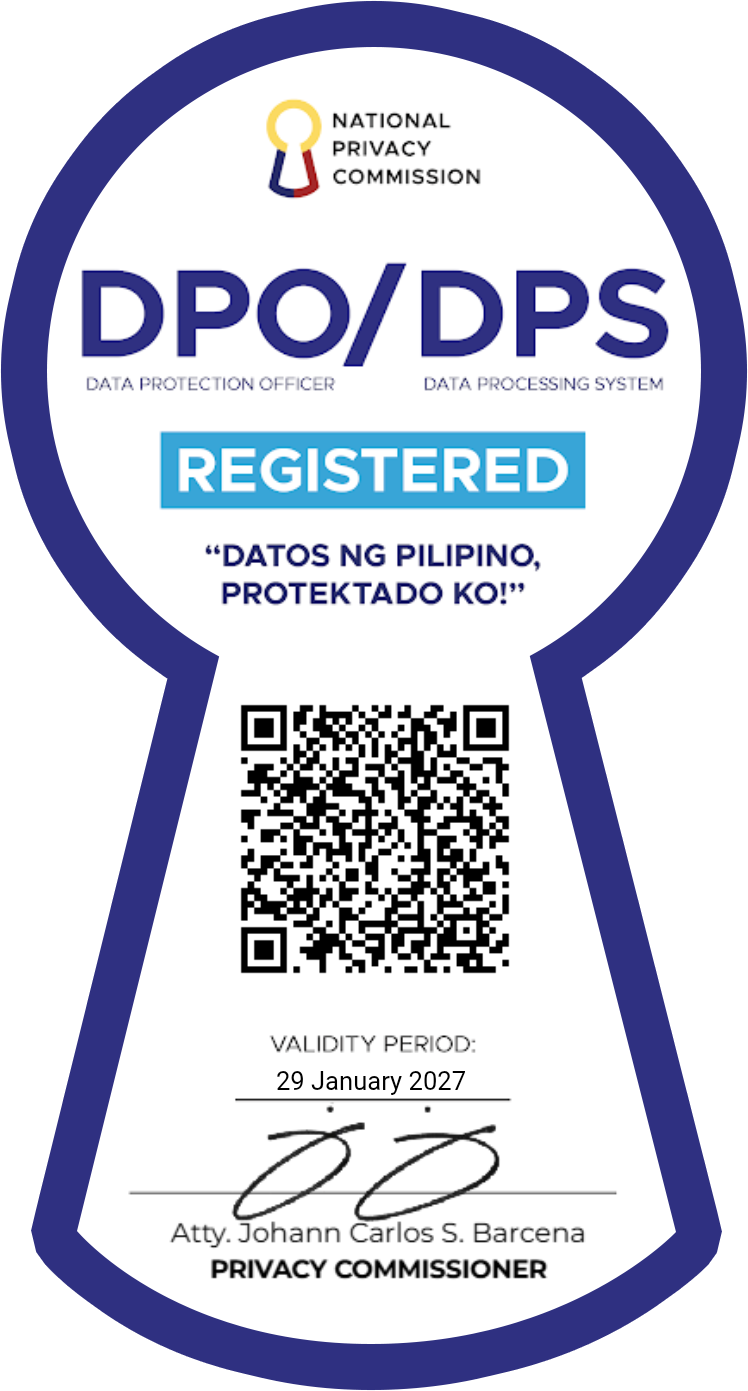Following the unified logo design guidelines outlined in The Golden Artisan, the official brand manual of Pampanga State University, the EECU Logo has been officially finalized:
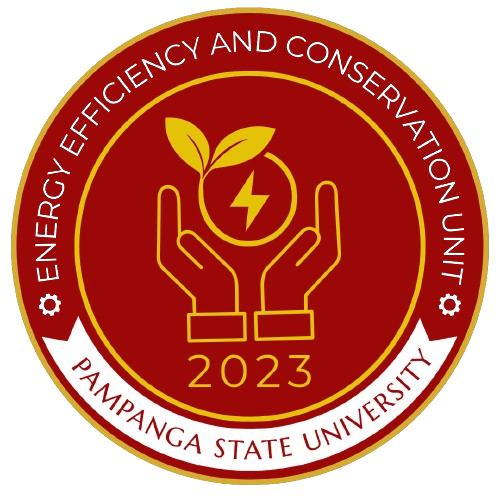
LOGO DESCRIPTION and SYMBOLISM
1. Outer Ring – Label and Identity:
The outer circular ring prominently displays the text:
“ENERGY EFFICIENCY AND CONSERVATION UNIT”, which identifies the official unit responsible for spearheading initiatives on sustainable energy use in the university.
The university name “Pampanga State University” is featured at the bottom, anchoring the unit within its institutional framework.
The gold border symbolizes prestige and integrity, while the gear icon is a reference to the University logo, which is in turn an homage to the industrial and trade school history of Pampanga State University.
2. Central Imagery – Symbol of Responsibility and Sustainability:
Two open hands cupping an energy orb represent protection, accountability, and stewardship over energy resources. It reflects the unit's role in safeguarding power consumption through responsible practices.
The orb, marked with a lightning bolt, symbolizes electricity—the primary energy form under management and review.
Leaves sprouting from the orb signify green energy, sustainability, and environmental consciousness, emphasizing the balance between energy use and ecological preservation.
3. The Year “2023”:
Signifies the year the unit and its initiatives were established and launched. It also reflects ongoing progress and contemporary relevance.
4. Color Palette:
Maroon or vivid red background denotes strength, resolve, and urgency—qualities essential to addressing energy inefficiencies.
Gold lines and text highlight value, excellence, and clarity in the mission.
The Energy Efficiency and Conservation Unit (EECU) is a dedicated unit responsible for spearheading the university’s efforts toward sustainable energy management. It aims to promote and implement strategies that reduce energy consumption, enhance energy efficiency, and foster environmental stewardship across all Pampanga State University campuses.
Operating under the guidance of national policies such as the Energy Efficiency and Conservation Act (RA 11285) and aligned with the university’s sustainability goals, the EECU ensures that Pampanga State University operates in an energy-conscious and cost-effective manner. The unit conducts energy audits, spot checks, monitors electricity use, recommends energy-saving measures, and engages the academic community through information dissemination and seminars.
Through collaboration with faculty, staff, students, and external stakeholders, the EECU plays a vital role in transforming the university into a model of energy efficiency in the higher education sector contributing not only to operational savings but also to the broader goal of environmental protection and climate action.
VISION, MISSION, TAGLINE
VISION
The EECU envisions to make Pampanga State University a model state university in the country institutionalizing energy efficiency and conservation.
MISSION
The EECU is committed to support the Republic Act 11285 (EEC Act) in securing efficiency and stability of energy supply in the country and Sustainable Development Goal (SDG) 7 in ensuring access to affordable, reliable, sustainable and modern energy for all.
TAGLINE
We’ve sown a SEED.
It’s time to LEAP!
Lead in Energy Conservation Ensure Energy Efficiency
Attain Energy Sustainability at Pampanga State University
Context:
Pampanga State University, formerly known as DHVSU, has evolved its commitment to sustainable development and energy efficiency through the rebranding of its original SEED initiative—Sustainable and Energy Efficient DHVSU. Building on this foundation, the university has embraced the LEAP acts, which stands for Lead in Energy Conservation, Ensure Energy Efficiency, and Attain Energy Sustainability at Pampanga State University.
This strategic shift signifies more than just a change in name or tagline; it represents a renewed and intensified commitment to environmental stewardship and responsible energy management. Under the LEAP framework, the Energy Efficiency and Conservation Unit (EECU) is challenged to step up its mandate—leading the university community in adopting innovative energy conservation practices, optimizing energy use, and fostering sustainable energy solutions.
TAGLINE ICON
The photo depicts an icon of a leaping figure with one foot as a seed which symbolically represents the university's journey from planting the initial seed of sustainability (the original SEED initiative) to taking bold, proactive steps forward through the LEAP ACTS. The seed-foot signifies the foundation—starting point of growth and potential—while the leap illustrates the university’s dynamic movement towards energy conservation, efficiency, and sustainability. Together, the icon embodies the idea that after sowing the seed of environmental responsibility, it’s now time
OVERVIEW
Legal Basis:
RA11285
Republic Act No. 11285 entitled: An Act Institutionalizing Energy Efficiency and Conservation, Enhancing the Efficient Use of Energy, and Granting Incentives to Energy Efficiency and Conservation Projects, otherwise known as, Energy Efficiency and Conservation Act (EEC Act) was approved and signed into law in April 12, 2019. In one of its “Declaration of Policy,” specifically in Section 2(a), it states that it is the policy of the State to institutionalize energy efficiency and conservation as a national way of life geared towards the efficient and judicious utilization of energy.
Under the law, the government is required to integrate energy efficiency practices into its procurement and operational activities. All public and private entities, particularly Designated Establishments (DEs), are mandated to develop and implement their own Energy Efficiency and Conservation Programs, appoint Energy Conservation Officers or Managers, and submit Energy Consumption and Conservation Reports regularly to the DOE.
The Act also introduces the Philippine Energy Labeling Program (PELP) and Minimum Energy Performance (MEP) standards for energy-consuming products, buildings, and industrial facilities. It provides for the establishment of an Energy Efficiency and Conservation Office in all local government units, promoting implementation at the community level.
Moreover, RA 11285 encourages private sector participation through incentives such as fiscal benefits and financing assistance for investments in energy-efficient technologies and practices.
Overall, Republic Act No. 11285 lays the groundwork for transforming the Philippines into a nation that values and practices energy efficiency, contributing to economic productivity, environmental sustainability, and energy security.
IAEECC
The Implementing Rules and Regulations (IRR) of the RA 11285 provides the guidelines of the implementation of the EEC Act. Furthermore, Rule VIII of the IRR pertains to the Government Energy Management Program (GEMP) with scope stated in section 43, covering all government agencies, including state universities and colleges. The Inter-Agency Energy Efficiency and
Conservation Committee (IAEECC), a committee created under Chapter 3, Section 9 of RA11285 to provide strategic direction in the implementation of GEMP, promulgated and adopted the GEMP Guidelines (Annex A of IAEECC Resolution No. 5 series 2022).
Chaired by the Secretary of the Department of Energy (DOE), the IAEECC serves as the central policy-making and coordinating body for the government's energy efficiency and conservation initiatives. Its mandate is to synchronize, harmonize, and oversee the implementation of energy efficiency and conservation programs within the public sector.
The Committee is composed of key government agencies, including the Department of Budget and Management (DBM), Department of the Interior and Local Government (DILG), Department of Transportation (DOTr), Department of Public Works and Highways (DPWH), Department of Science and Technology (DOST), Department of Trade and Industry (DTI), Department of Finance (DOF), and the National Economic and Development Authority (NEDA), among others. This inter-agency composition ensures multi-sectoral collaboration and policy alignment.
The IAEECC is primarily responsible for:
● Formulating guidelines for the government’s energy efficiency and conservation programs, including the adoption of energy efficiency measures in government operations and facilities.
● Overseeing the implementation of Government Energy Management Programs (GEMP), which mandate all government entities to reduce electricity and fuel consumption.
● Ensuring compliance with energy efficiency standards through monitoring, evaluation, and performance-based reporting mechanisms.
● Endorsing fiscal incentives for government energy efficiency projects and investments under applicable laws.
By centralizing leadership and fostering inter-agency cooperation, the IAEECC plays a vital role in mainstreaming energy efficiency and conservation as integral elements of public governance. Its actions contribute to reducing government energy consumption, optimizing resource utilization, and supporting the country’s broader energy security and climate goals.
GEMP
The Government Energy Management Program (GEMP) is a flagship initiative established under Republic Act No. 11285, or the Energy Ef iciency and Conservation Act, to institutionalize energy efficiency and conservation across all government agencies and instrumentalities in the Philippines.
Spearheaded by the Department of Energy (DOE) and overseen by the Inter-Agency Energy Efficiency and Conservation Committee (IAEECC), the GEMP is designed to reduce the government’s energy consumption, lower operating costs, and demonstrates leadership in sustainable energy use.
The GEMP also aligns procurement practices with energy conservation goals, requiring the purchase of energy-efficient products and the implementation of lifecycle cost analysis in evaluating government investments.
Through the GEMP, the government exemplifies its commitment to sustainable development, climate change mitigation, and energy security. It reinforces the principle that public institutions must lead by example in adopting responsible and cost-effective energy use.
DOE ORDERS
Department Orders are formal and authoritative issuances issued by the head of a government department—such as the Secretary of Energy in the case of the Department of Energy (DOE)—that establish policies, define responsibilities, and provide administrative direction for the implementation of existing laws, regulations, or internal policies.
These orders serve as official instruments to operationalize legal mandates, standardize internal processes, and ensure effective governance and compliance among relevant sectors and stakeholders. Department Orders are critical in translating broad policy objectives into actionable and enforceable measures within the department's jurisdiction.
DOE CIRCULARS
DOE Circulars are official policy issuances released by the Department of Energy (DOE) of the Philippines, signed by the Secretary of Energy, to formally establish, implement, and interpret policies, procedures, and programs related to the energy sector. These circulars are legal instruments used to operationalize the provisions of existing energy laws, ensure compliance, and provide clear guidance to stakeholders such as government agencies, energy companies, service providers, and the general public.
ADMINISTRATIVE ORDERS (EEC ACT RELATED)
Administrative Order No. 15, s. 2024 (AO 15) aims to intensify the efficient utilization and conservation efforts of electricity and fuel to mitigate power demand amidst the ongoing El Niño phenomenon and beyond.
Institutionalization:
To address the thrust of the government on energy efficiency and conservation, the Energy Efficiency and Conservation Unit (EECU) was included in the DHVSU (now Pampanga State University) Revised Organizational Framework which was approved by virtue of Board of Reagent (BOR) Resolution No. 09, Series 2023 dated January 30, 2023. The EECU is directly under the Administrative Services Office (AdminSO).
UNIT OBJECTIVES
ENERGY EFFICIENCY and CONSERVATION UNIT CRAFTed OBJECTIVES
Community Engagement:
Foster active participation of the campus community and stakeholders through awareness campaigns, educational programs, and outreach initiatives to promote sustainable practices and environmental responsibility.
Reduce Carbon Emissions:
Aim to reduce the University’s carbon footprint by exploring and adopting renewable energy sources and innovative technologies, such as solar panels and fuel-efficient and electric vehicles.
Alignment with Policies:
Ensure the University’s sustainability practices are aligned with local and international standards, including the use of LED lighting, inverter technologies, green building codes, fuel economy and comprehensive energy audits to promote compliance and best practices.
Foster Innovation:
Support faculty and student research and projects on sustainability and energy efficiency by facilitating collaborations, providing access to useful data, and delivering technical feedback to drive practical solutions.
Targeted Improvements:
Achieve at least a 10% annual reduction in consumption of electricity and petroleum products, following the guidelines established by the Government Energy Management Program under the Energy Efficiency and Conservation Act, to ensure continuous progress in sustainable campus operations.
